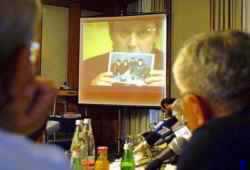A former Russian security agent offered evidence Thursday meant to support his claim that the KGB's successor, not Chechen fighters, engineered a series of deadly bombings that thrust Russia into a new war in Chechnya in 1999. In a video link with Britain, where he fled two years ago, Alexander Litvinenko said he received the evidence in a statement from Achimez Gochiyayev, who Russia claims was paid 500,000 U.S. dollars by a Chechen warlord of Arab origins to organize two apartment-building bombings in Moscow. (Read photo caption)
"The material that Gochiyayev gave us is extremely important for establishing the truth," Litvinenko said.
The purported evidence includes Gochiyayev's statement that he rented space in the two Moscow buildings destroyed in the blasts at the request of a childhood friend he now suspects was a Russian security agent. The friend allegedly told Gochiyayev he needed to store goods he was selling.
Gochiyayev's whereabouts are unknown, but it's believed he is not in Russia.
Litvinenko said he had received the statement through middlemen somewhere in Europe. He presented it in a television hookup with a meeting of an unofficial Russian commission investigating the bombings that killed about 300 people.
A spokesman for the Federal Security Service, or FSB, would not comment on Litvinenko's accusations to The Associated Press.
FSB official Ivan Mironov told NTV television that arrested bombing suspect Adam Dekkushev has implicated "Chechen terrorists" including associates of Gochiyayev in the bombings. NTV showed FSB footage of Dekkushev apparently explaining to investigators how explosives were brought to Moscow. Litvinenko said FSB claims about statements made under questioning cannot be trusted.
A few weeks after the last of four apartment-building explosions in September 1999 - two in Moscow and two in southern Russia - President Boris Yeltsin and his prime minister, former KGB agent Vladimir Putin, sent Russian troops into Chechnya.
Russian officials blamed the blasts on Chechen fighterw, though Chechen leaders denied involvement and suggested the security service organized them to justify the military campaign.
Putin, whose tough stance against the Chechen fighters helped him gain popularity, was appointed acting president by Yeltsin in December 1999 and was elected president in 2000.
In Gochiyayev's purported statement, he denies he organized the blasts or had ties with the warlord, a Jordanian named Khattab who was killed this year. He says that after the second explosion, he called police and warned them that he feared there might be explosions in two other buildings where he was renting space. Authorities said that they found explosives and timers in one of the buildings.
Yevgeny Taratorin, a senior Interior Ministry investigator who helped inspect that building, told TVS television that there were no such calls from Gochiyayev.
Litvinenko urged the commission investigating the bombings to ask Russian authorities to look for audio recordings of the calls Gochiyayev claims he made.
Litvinenko also said that a British forensic imagery analyst had examined FSB photographs purporting to show Gochiyayev with Khattab and said it could not be determined whether the man in the photo was in fact Gochiyayev.
The analyst, Geoffrey Oxlee, confirmed that in a telephone interview.
The head of the public commission investigating the bombings, respected human rights activist Sergei Kovalyov, said Litvinenko's information was "of extreme interest" but must be thoroughly examined.
Kovalyov said there was evidence for and against the opposing theories of who was behind the bombings - Chechen fighters or Russian agents - and that it might turn out that neither is accurate. He said the commission was not close to a decision on its findings.
Litvinenko's troubles with the FSB began in 1998 when he accused his superiors of ordering him to kill tycoon Boris Berezovsky. Litvinenko was arrested and jailed a year later on abuse of office charges but was subsequently acquitted. He fled to Britain in November 2000.
Litvinenko has been closely associated with Berezovsky, a highly controversial former Kremlin insider who is now a fierce opponent of Putin. Berezovsky also accuses the FSB of complicity in the bombings and lives in self-imposed exile in Britain to escape Russian criminal charges he says are politically driven.
A military court convicted Litvinenko in absentia last month of abuse of office and stealing explosives, and gave him a 3-year suspended sentence.
PHOTO CAPTION
Press and officials watch a video link with Britain, where Alexander Litvininko (on the screen) said he received a statement from Achimez Gochiyaev, who Russian authorities claim was paid 500,000 to organize bombings by Khattab, a warlord in Chechnya who was killed earlier this year. Litvinenko, a former Russian security agent, who was granted asylum in Britain after fleeing Russia, and who claims the successor of the Soviet KGB was behind deadly apartment-house bombings that thurst Russia into a new war in Chechnya three years ago presented evidence Thursday that he said support his accusation. (AP Photo/ Maxim Marmur )
- Jul 25 4:50 PM
- Author:
& News Agencies - Section:
WORLD HEADLINES


 Home
Home Discover Islam
Discover Islam Quran Recitations
Quran Recitations Lectures
Lectures
 Fatwa
Fatwa Articles
Articles Fiqh
Fiqh E-Books
E-Books Boys & Girls
Boys & Girls  Women
Women










